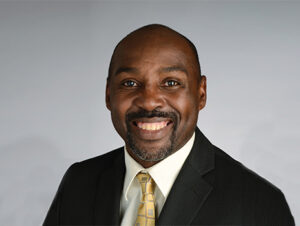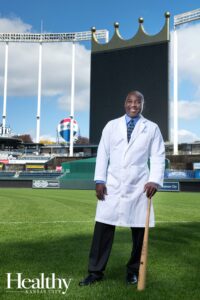Inductees
Dr. Vincent Key


There’s an old saying in sports that you best be ready when you’re number is called. And perhaps there is no better example in the sports medicine world than Dr. Vincent Key.
From the 1990s and into the early 2000s, he simply paid attention as he tended to pro athletes when in residency in Los Angeles and during a fellowship in Cincinnati.
So in 2009, the Kansas City Royals came calling.
“My name was brought up to make a change in their medical care,” Key said. “I believe the hospital also was working on a marketing deal with the Royals, so it was perfect timing. I met with general manager Dayton Moore (MSHOF 2022) and the head athletic trainer, Nick Kenney, and we really vibed as to the way the team should be run from a sports medicine perspective.”
This summer marks Dr. Key’s 14h year as the Royals’ Medical Director and Head Team Physician, and his work is why the Missouri Sports Hall of Fame proudly inducted him with the Class of 2024.

Dr. Key is an associate professor of Orthopedic Surgery/Sports Medicine at the University of Kansas Health System (Department of Orthopedic Surgery) and, in 2022, was the president of the Major League Baseball Team Physicians Association. He also served on the medical advisory committee for Major League Baseball. He also is an associate physician with USA Track and Field.
And a trailblazer, too. You see, Dr. Key is the only African-American head team physician in MLB and one of only a handful in all three major pro sports – baseball, football and basketball.
“I do step back and thank God for the opportunity to be chosen to take care of the Kansas City Royals and to be able to work within MLB,” Key said. “The Royals organization has been a tremendous organization to be a part of and has treated myself and my family exceedingly well. I get the opportunity to not only build relationships with my athletes, medical staff, front office staff and ownership but also their families.”
Among his success stories are the treatment and recovery of Royals catcher Salvador Perez following knee and elbow injuries, as well as various injuries to outfielder Alex Gordon (MSHOF 2020).
On the MLB medical advisory committee, Key provided guidance on various rules changes, including home plate collisions in an effort to reduce concussions. The committee also is at the forefront of research to prevent shoulder and elbow injuries in professional and youth baseball.

“When I meet a player, I tell them that I will ‘keep it real’ with them,” Key said. “I will not lie to them. There are times when the ‘team’ wins and there are times when a ‘player’ wins a situation. That is not my job to be in that situation. My job is to ‘stay in the middle’ and tell the truth.”
A 1984 state long jump champion at Spring Hill (Kan.) High School, Key later received his bachelor’s degree in pre-medicine at Kansas State University, where he was also a track and field athlete.
He then attended medical school at the University of Oklahoma College of Medicine and did an Orthopedic Surgery residency at King/Drew Medical Center in Los Angeles. He also completed a Sports Medicine Fellowship with Wellington Orthopedics/University of Cincinnati.
In Los Angeles, his attending physicians were the team physicians of the Dodgers, Angels and Lakers, as well as other pro athletes across the country and world. In Cincinnati, he was around Bengals and Reds.
“I was not in awe of professional athletes, and I think that made me a lot more confident and comfortable in that setting,” said Key, who is certified by the American Board of Orthopedic Surgery with a sub certification in sports medicine.
His mentors over the years have been Drs. Clarence Shields, Lew Yocum, Robert Heidt, Keith Meister and James Andrews.
Other than his work with the Royals, he has a passion for treating young athletes. Key specializes in arthroscopic procedures and the treatment of shoulder, elbow and knee injuries for professional athletes, young athletes and weekend warriors.
His thoroughness stems from the fact that he and his wife are parents to four NCAA Division I athletes – Kaelin, Cameron, Carson and Kaiya.
His own parents, John and Barbara, taught him to “go the extra mile.”
“They taught me to be able to ‘talk to people,’ and not ‘talk at people,’ to stay humble and do my absolute best,” Key said.